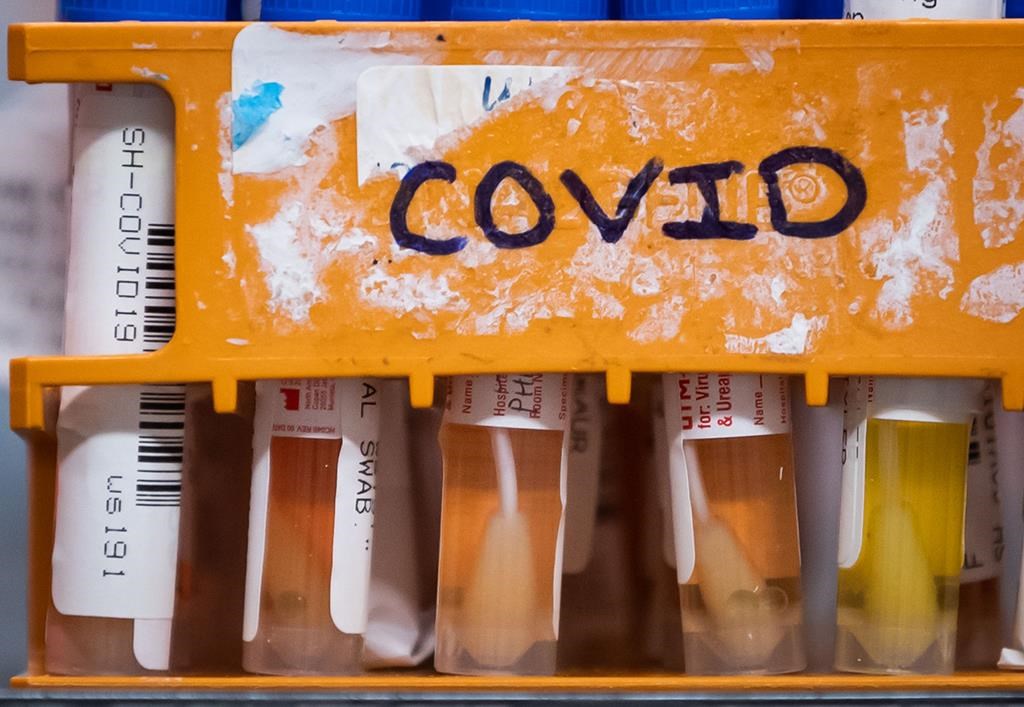With COVID-19 infections and hospitalizations on the rise in the U.S., Europe and Asia, Albertans are left wondering if the same thing is happening in the province.

“We’re really flying blind right now, as parents, around what we can do to protect our children,” Sara Austin, a Calgary mother of a 12-year-old, told Global News.
Alberta Health confirmed to Global News that it moved to monthly reporting of COVID data at the end of June, an unannounced change.
The provincial data dashboard hasn’t been updated since July 24 and won’t be until Aug. 30, as part of a new reporting cadence.
Wastewater data that was released by the province’s universities regularly for the past three years is undergoing a handoff to provincial labs.

With a new school year just weeks away, the lack of knowledge has some parents like Austin concerned.
“That information is a critical tool for all of us to be able to take adequate measures around what’s needed to protect ourselves and others, and not having that information really puts us all at risk and is doing our community a disservice,” Austin, who also is the founder and CEO of Children First Canada, said.
“We do really need public health officials, and school officials as well, to step up and do what we know works to protect our children.”
The province said it is moving its COVID reporting to be “more aligned” with influenza reporting, and will be more responsive to changes in the amount of disease in the province.

Public reporting of influenza data increases in frequency at the start of a new influenza season, usually late August or early September, with evidence of increased transmission and is reduced when cases are low.
For the decade preceding COVID-19, influenza exhibited a seasonality, with the peaks of waves usually coming in the winter months.
The past three years of the ongoing COVID-19 pandemic showed peaks in waves of cases, hospitalizations and wastewater levels in all four seasons.
Alberta Health said if COVID metrics worsen, the province will publicly report data more frequently.

Caroline Colijn, research chair in Mathematics for Evolution, Infection and Public Health at Simon Fraser University, said having more time between infectious disease data releases increases the likelihood citizens might miss an increase in cases.
“There’s a benefit to reporting regularly to the public because people can see things, people can have information about their own risk – we’re asked to manage their own risk for COVID-19,” Colijn said.
“I do think there’s a value to having up-to-date and reliable COVID and other infectious disease data so that people can protect themselves.”
Another public health professor said throughout the pandemic, people have learned how to read trends in wastewater data and COVID case counts to help them make decisions.
“I think people get very good at looking at dashboards and learning and understanding how to follow data like we follow the weather,” University of Minnesota professor Rebecca Wurtz said.
- ‘Unprofessional’: Couple waits hours at a hospital to see a doctor who wasn’t there
- N.S. mom calls for better ultrasound access after private clinic reveals twins
- 3 women diagnosed with HIV after ‘vampire facials’ at unlicensed U.S. spa
- Solar eclipse eye damage: More than 160 cases reported in Ontario, Quebec
“People are very accustomed to following the weather, and I think people became much more accustomed to following data about disease and allowing it to inform their decisions. Surveillance is the foundation of public health.”
Rick Cammidge, a father of four in St. Albert, Alta., said he and his family have been frequently consulting Alberta’s COVID-19 dashboard and University of Calgary’s Centre for Health Informatics (CHI) website for wastewater data for the past few years. Lately, it’s been used as part of their planning to reintroduce more pre-pandemic activities.
Cammidge, who owns an insurance brokerage, is very familiar with risk management and reading data, and his wife has a background in health care. He said the change in COVID reporting reduces his family’s ability to assess their own risk.
“I deal with risk every day,” he said. “(The government has) really eliminated our ability to actually assess risk and determine whether we should be taking the risk or not.”
Early in the pandemic, the Cammidges quickly pivoted to wearing masks and other measures in order to prevent exposure to a novel virus that has since been found to increase risk of heart disease, kidney failure and type 1 diabetes in kids.
With another school year on the near horizon, Cammidge’s wife said the lack of COVID reporting is preventing her from being able to assess the risk in the community before sending their kids back to school.

For the past three years, Albertans have been able to visit the CHI website for COVID wastewater data for towns and cities province-wide.
On Monday, it posted a notice that as of July 31, that role was being transitioned to Alberta Health and Alberta Precision Laboratories (APL).
Influenza and RSV in wastewater will continue to be monitored by the Pan-Alberta Wastewater Monitoring Team that includes members from the U of C and University of Alberta.
“We are proud to have provided this public health service to the citizens of Alberta for the last three years, in partnership with the University of Alberta, Alberta Health Services, (Alberta Health), APL and municipalities across the province,” the U of C said in a statement.
The province said the next tranche of COVID wastewater data will be released in two weeks’ time and will be released monthly until something changes, a marked departure from the previous issuance of multiple times per week.
Alberta Health officials will continue to monitor all COVID-related data internally.

Austin said COVID has fallen off the radar for some of the parents she’s spoken to as part of her advocacy efforts, while other parents have expressed concerns about the dropping of nearly all public health measures inside and outside of medical settings.
“I think part of the disconnect I’m hearing between parents who have no concerns and parents who are gravely concerned is the lack of evidence-based information that’s being made available by public health authorities,” she said.
Colijn said data on what the disease is doing in the community is necessary for a public conversation on how to best handle COVID to everyone’s benefit.
“I think to have that public conversation, we need data. And, you know, we don’t necessarily need the daily data or weekly data, but I think we need data on what’s happening not just in hospitals or in certain key populations, but we need data about what’s happening in the community, how many people have COVID, how many people have long COVID,” the research chair said.
“I think we need to be monitoring that. I think we need to be thinking about it as a society — what we’re going to do.”




Comments